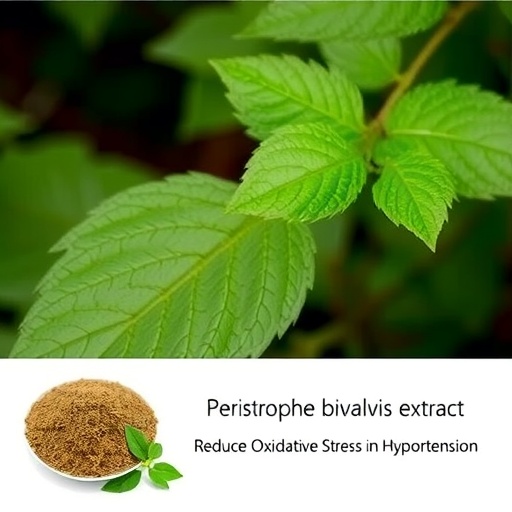In a groundbreaking study published in BMC Complementary Medicine and Therapeutics, researchers have unveiled the substantial potential of the aqueous extract of Peristrophe bivalvis leaves in ameliorating oxidative stress, particularly in the context of L-NAME-induced hypertension. This research not only highlights the therapeutic prospects of this underexplored plant but also emphasizes the critical role of oxidative stress in the pathology of hypertension, a condition that continues to affect millions globally.
Peristrophe bivalvis, a plant belonging to the Acanthaceae family, is noted for its traditional medicinal uses in various cultures. Historically, it has been employed for treatments ranging from infections to inflammatory conditions. The aqueous extract of its leaves has been identified as a rich source of phytochemicals that possess significant antioxidant properties. In the present study, the researchers focused on elucidating how these extracts could counteract oxidative stress induced by a potent nitric oxide synthase inhibitor, L-NAME, commonly used to induce hypertension in animal models.
Hypertension is a multifaceted health issue characterized by consistently elevated blood pressure, contributing to the pathogenesis of numerous cardiovascular diseases. One of the mechanisms underlying hypertension is oxidative stress, which causes an imbalance between reactive oxygen species (ROS) and the body’s antioxidant defenses. Increased levels of ROS lead to vascular damage and dysfunction, highlighting an urgent need for effective therapeutic strategies. The use of natural products, such as the aqueous extract from the leaves of Peristrophe bivalvis, presents a promising avenue for addressing this oxidative milieu.
In this pivotal study, the researchers utilized a controlled experimental design involving hypertensive rats induced by L-NAME administration. After establishing the hypertensive model, the rats were treated with varying doses of the aqueous extract from Peristrophe bivalvis leaves. The administration of the extract significantly reduced markers of oxidative stress, which was evident through various biochemical assays assessing the levels of malondialdehyde, superoxide dismutase, and total antioxidant capacity. The findings suggest that this plant extract not only mitigates oxidative damage but also enhances the body’s own antioxidant mechanisms.
Furthermore, the study delves into the molecular pathways through which Peristrophe bivalvis exerts its protective effects. The researchers discovered that the aqueous extract modulates specific signaling pathways linked to oxidative stress and inflammation. These findings are crucial in understanding how natural compounds can interact synergistically with biological systems to restore homeostasis in hypertensive conditions. The results hint at the potential for developing novel phytotherapeutics aimed at managing hypertension and improving overall cardiovascular health.
Moreover, the evolving field of nutraceuticals is gaining momentum, advocating for the integration of dietary supplements derived from natural sources into conventional treatment regimens. This study advocates not only for the recognition of Peristrophe bivalvis as a potential adjunct therapy for hypertension but also for the broader application of plant-based extracts in managing oxidative stress-related conditions. The accessibility and affordability of such natural products might enable more individuals to address health issues without the hefty side effects often associated with synthetic pharmaceuticals.
The implications of these findings reach beyond the realm of hypertension. Oxidative stress is a contributing factor in numerous health conditions, including diabetes, neurodegenerative diseases, and even cancer. The prospect of harnessing the antioxidant properties of Peristrophe bivalvis could revolutionize treatment strategies across various medical disciplines. Researchers are hopeful that further studies can expand on these preliminary findings, potentially leading to clinical trials that evaluate the efficacy of Peristrophe bivalvis extracts in human populations.
The exciting results of this study resonate with a growing interest in ethnobotanical research, wherein traditional knowledge is validated through scientific inquiry. By bridging the gap between ethnomedicine and modern pharmacology, researchers can unearth the medicinal potential harbored within countless plant species. Each discovery paves the way for innovative treatment options that could drastically change patient outcomes in chronic diseases.
In conclusion, the aqueous extracts of Peristrophe bivalvis leaves demonstrate marked promise as a natural remedy to combat oxidative stress in L-NAME-induced hypertension. This research underscores the significance of developing plant-based therapeutics in the face of rising health issues related to oxidative damage and chronic diseases. As more explorations into the beneficial properties of various plants unfold, the integration of traditional healing practices with modern medical approaches could herald a new era of comprehensive healthcare.
In summary, this study offers a significant insight into the potential health benefits of Peristrophe bivalvis, revealing the importance of antioxidants in preventing and managing conditions exacerbated by oxidative stress. It advocates for further research into the mechanisms of action and bioactive compounds found in this plant, which could lead to the development of effective treatments that are both safe and beneficial for patients suffering from hypertension and oxidative stress-related disorders.
Subject of Research: The effects of aqueous extract of Peristrophe bivalvis leaves on oxidative stress in hypertensive rats.
Article Title: Aqueous extract of Peristrophe bivalvis leaf alleviates oxidative stress in L-NAME-induced hypertensive rats.
Article References:
Aluko, E.O., Oyeyemi, W.A. & Fasanmade, A.A. Aqueous extract of Peristrophe bivalvis leaf alleviates oxidative stress in L-NAME-induced hypertensive rats.
BMC Complement Med Ther 25, 333 (2025). https://doi.org/10.1186/s12906-025-05071-x
Image Credits: AI Generated
DOI: 10.1186/s12906-025-05071-x
Keywords: Peristrophe bivalvis, oxidative stress, hypertension, antioxidants, herbal medicine, phytotherapy, nitric oxide synthase, cardiovascular health.




